Filter by

What Literature Knows: Forays into Literary Knowledge Production
This volume sheds light on the nexus between knowledge and literature. Arranged historically, contributions address both popular and canonical English and US-American writing from the early modern period to the present. They focus on how historically specific texts engage with epistemological questions in relation to material and social forms as well as representation. The authors discuss liter…
- Edition
- -
- ISBN/ISSN
- 9783631757864
- Collation
- -
- Series Title
- -
- Call Number
- -

What is Québécois Literature? Reflections on the Literary History of Franco…
The question ‘What is Québécois literature?' may seem innocent and answerable, yet Rosemary Chapman's compelling study shows that to answer it is to chart the cultural history of French Canada, to put francophone writing in Canada in postcolonial context and to ask whether literary history, with its focus on the nation, is in fact obsolete. This remarkable book will be compulsory re…
- Edition
- -
- ISBN/ISSN
- 9781846319730
- Collation
- -
- Series Title
- -
- Call Number
- -

A war of individuals: Bloomsbury attitudes to the Great War
This book draws together for the very first time examples of the 'aesthetic pacifism' practised during the Great War by such celebrated individuals as Virginia Woolf, Siegfried Sassoon and Bertrand Russell. In addition, the book outlines the stories of those less well-known who shared the mind-set of the Bloomsbury Group when it came to facing the first 'total war'. The research for this study …
- Edition
- -
- ISBN/ISSN
- 9780719060700
- Collation
- -
- Series Title
- -
- Call Number
- -

Wallenstein
" By the time Frederich Schiller came to write the Wallenstein trilogy, his reputation as one of Germany’s leading playwrights was all but secured. Consisting of Wallenstein’s Camp, The Piccolomini and The Death of Wallenstein, this suite of plays appeared between 1798 and 1799, each production under the original direction of Schiller’s collaborator and mentor, Johann Wolfgang (von) Goeth…
- Edition
- -
- ISBN/ISSN
- 9781783742653
- Collation
- -
- Series Title
- -
- Call Number
- -

Voyages
Susanna Moodie is, of course, best known for her books Roughing It in the Bush and Life in the Clearings, which are largely comprised of short sketches that she had previously published. What is not widely known, however, is that Moodie had a long and prolific literary career in which short sketches and tales were among her favoured genres. This book offers a selection of these narratives, most…
- Edition
- -
- ISBN/ISSN
- 9780776603261
- Collation
- -
- Series Title
- -
- Call Number
- -
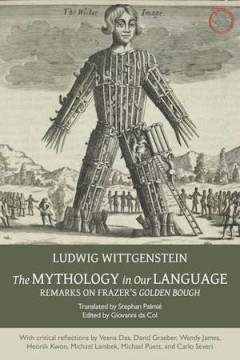
Vitality and Dynamism: Interstitial Dialogues of Language, Politics, and Reli…
Post-colonial theory recognizes that European and American scholars have traditionally defined the themes that are of interest in literary criticism; in Moroccan studies, these themes have tended toward questions of migration, identity, secularism, and religious fanaticism typically questions regarding Morocco in its relationships with colonizing nations. This book intends to re-define the them…
- Edition
- -
- ISBN/ISSN
- 9789087282134
- Collation
- -
- Series Title
- -
- Call Number
- -
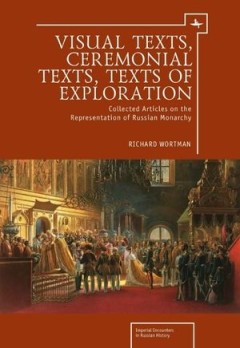
Visual Texts, Ceremonial Texts, Texts of Exploration: Collected Articles on t…
Visual Texts, Ceremonial Texts, Texts of Exploration continues the work begun in Russian Monarchy: Representation and Rule, which analyzed the interplay between the symbolic representations of Russian monarchs and the legal and institutional instruments of their rule. The articles in this volume examine the texts that, through various media, revealed the myths and scenarios conveying the goals …
- Edition
- -
- ISBN/ISSN
- 9781618113474
- Collation
- -
- Series Title
- -
- Call Number
- -
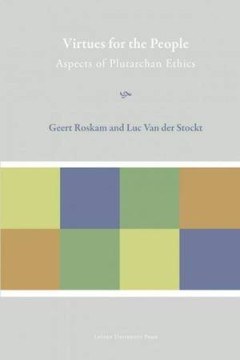
Virtues for the People: Aspects of Plutarchan Ethics
Plutarch of Chaeronea was by no means an armchair philosopher. He believed in the necessity for a philosopher to affect the lives of his fellow citizens. That urge inspired many of his writings to meet what he considered people's true needs. Although these writings on practical ethics illustrate in various ways Plutarch's authorial talents and raise many challenging questions (regarding their o…
- Edition
- -
- ISBN/ISSN
- 9789058678584
- Collation
- -
- Series Title
- -
- Call Number
- -
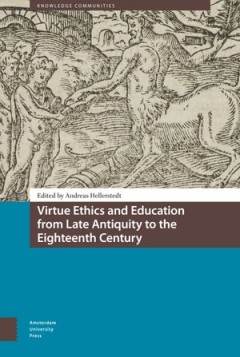
Virtue Ethics and Education from Late Antiquity to the Eighteenth Century
This book argues that premodern societies were characterized by the quest for “virtue.” The concept of virtue, complicated and much fought-over, permeated society, encouraging wisdom, courage, and justice, while simultaneously legitimizing social hierarchies based on sex and nationality. By examining pedagogical texts, rituals, performances, and images, this book illuminates the evolution o…
- Edition
- -
- ISBN/ISSN
- 9789048535101
- Collation
- -
- Series Title
- -
- Call Number
- -
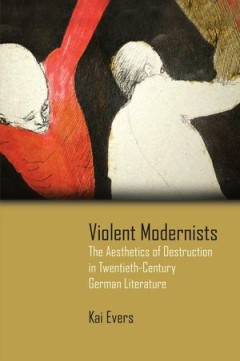
Violent Modernists: The Aesthetics of Destruction in Twentieth-Century German…
Kai Evers’s Violent Modernists: The Aesthetics of Destruction in Twentieth-Century German Literature develops a new understanding of German modernism that moves beyond the oversimplified dichotomy of an avant-garde prone to aggression on the one hand and a modernism opposed to violence on the other. Analyzing works by Robert Musil, Franz Kafka, Karl Kraus, Walter Benjamin, Elias Canetti, and …
- Edition
- -
- ISBN/ISSN
- 9780810129306
- Collation
- -
- Series Title
- -
- Call Number
- -
 Computer Science, Information & General Works
Computer Science, Information & General Works  Philosophy & Psychology
Philosophy & Psychology  Religion
Religion  Social Sciences
Social Sciences  Language
Language  Pure Science
Pure Science  Applied Sciences
Applied Sciences  Art & Recreation
Art & Recreation  Literature
Literature  History & Geography
History & Geography